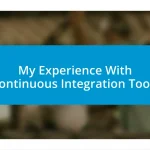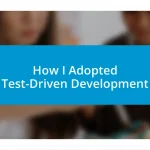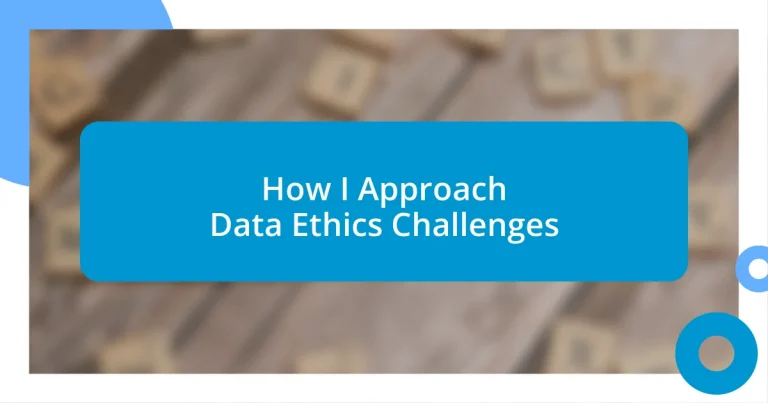Key takeaways:
- Emphasized the importance of transparency and fairness in data practices to build trust and address biases in algorithms.
- Highlighted common ethical challenges such as data privacy, transparency, and bias, and the need for clear communication regarding data usage.
- Outlined actions for implementing ethical frameworks, including developing guidelines, regular training, and involving stakeholders to promote a culture of ethical mindfulness.
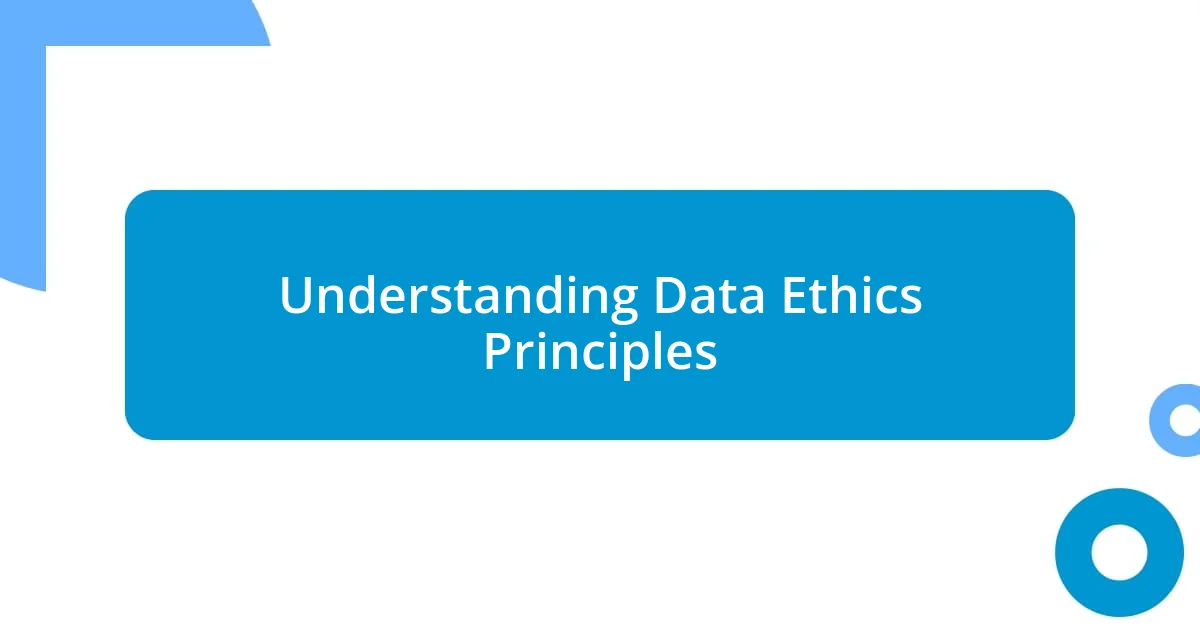
Understanding Data Ethics Principles
Data ethics principles serve as a crucial framework, guiding our actions in an increasingly data-driven world. For instance, when I first began working with user data, I was struck by how easily one could lose sight of individual privacy in the pursuit of insights. How do we protect those vulnerable identities while still deriving value from the data collected?
As I delved deeper, I realized that transparency emerges as a cornerstone of ethical data practices. I vividly recall a project where we shared our data handling processes with participants, and their relief was palpable—like a weight lifted. It made me wonder: how much trust could we build simply by being open about our methodologies?
Moreover, the principle of fairness consistently challenges me to reflect on the implications of biased algorithms. I remember a scenario in which an AI model I was working on inadvertently reinforced existing stereotypes. This experience led me to question—how do we ensure that our data practices elevate rather than undermine marginalized voices in our society? These principles resonate deeply and remind me daily that ethical considerations are as vital as the data itself.
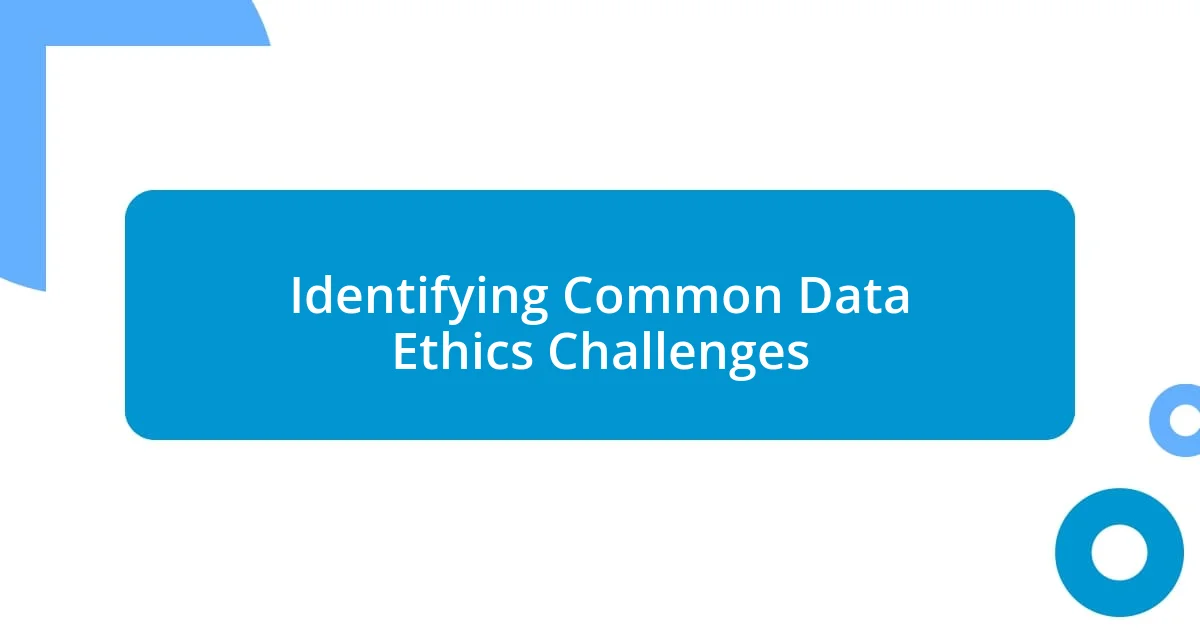
Identifying Common Data Ethics Challenges
Identifying common data ethics challenges is essential in navigating the complexities of our digital age. One prevalent issue I’ve encountered is data privacy. In one particular project, I oversaw user data collection, and I found myself grappling with how much information we could ethically gather without crossing boundaries. The anxiety of potential misuse kept me awake at night, and it reminded me of the profound responsibility we have towards the individuals behind the data.
Another major challenge is ensuring data transparency. During a process audit, I uncovered gaps in how our data usage was communicated to participants. I can still recall the sinking feeling when I realized our approach lacked the clarity needed for participants to feel secure. It taught me that clear communication can create an atmosphere of trust.
Lastly, the challenge of addressing bias in data is ever-present. I remember reviewing a model that seemed fair on the surface but, upon deeper analysis, consistently favored one demographic over others. It was a harsh reminder that without critical examination, our tools might reinforce societal inequities. I learned that actively seeking diverse perspectives can help mitigate such biases and foster more equitable outcomes.
| Data Ethics Challenge | Description |
|---|---|
| Data Privacy | The challenge of ensuring individuals’ information is collected and used ethically. |
| Transparency | The need to communicate data practices clearly to build trust with participants. |
| Bias | The risk that algorithms may unintentionally reinforce existing societal inequalities. |
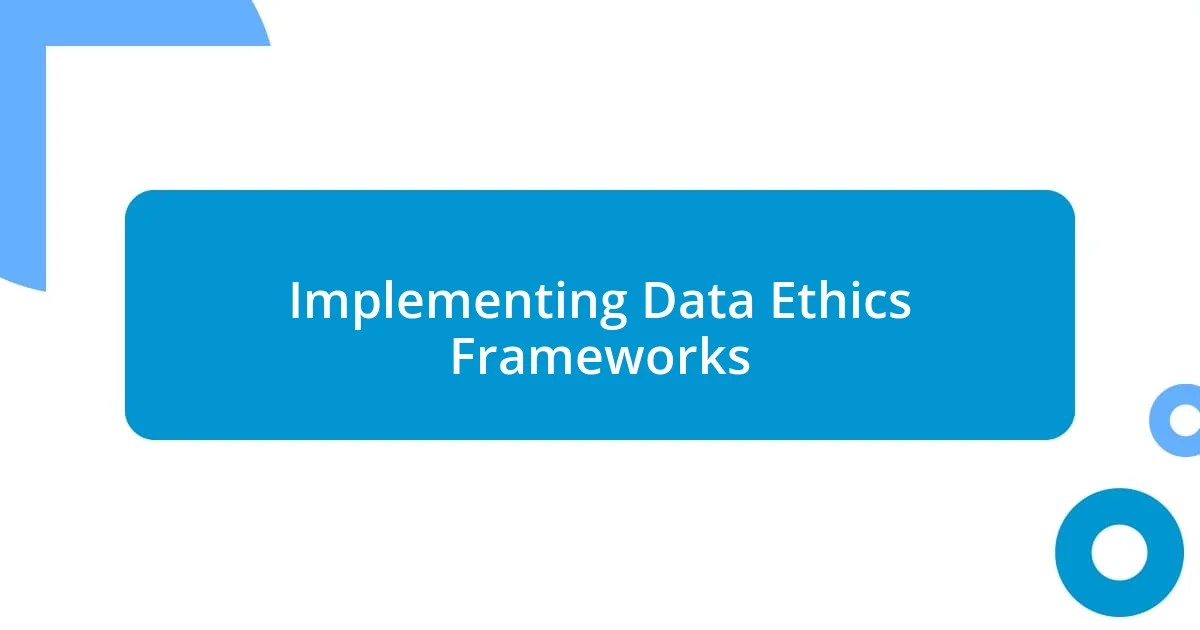
Implementing Data Ethics Frameworks
Implementing data ethics frameworks requires a combination of clear guidelines and an organizational commitment to ethical practices. When I first introduced an ethical review process for our data projects, I was met with some skepticism. However, once team members began to see the positive impact—like an increased sense of accountability and confidence in our decision-making—it became clear that having a structured framework enhances both our work and our relationships with the communities we serve.
To effectively implement data ethics frameworks, consider these key actions:
- Develop Clear Guidelines: Establish comprehensive, clear policies that everyone can refer to.
- Train Your Team: Invest in regular training sessions that emphasize ethical considerations and the importance of data integrity.
- Create a Feedback Loop: Encourage open dialogue about ethical concerns and cultivate a culture where team members feel safe to voice their challenges or uncertainties.
- Assess Impact Regularly: Implement routine assessments of how your data practices align with ethical standards and adjust accordingly based on findings.
- Involve Stakeholders: Engage with stakeholders and the communities affected by your data practices to ensure their voices are heard and considered throughout the process.
In my experience, this holistic approach not only strengthens the framework but also fosters a culture of ethical mindfulness. When my team began to actively seek out diverse opinions during discussions about our data protocols, the differences in perspective led to more robust solutions. I was moved by how this inclusivity created a palpable sense of partnership among team members, reminding me that ethics in data isn’t just a checkbox—it’s about connection and responsibility.
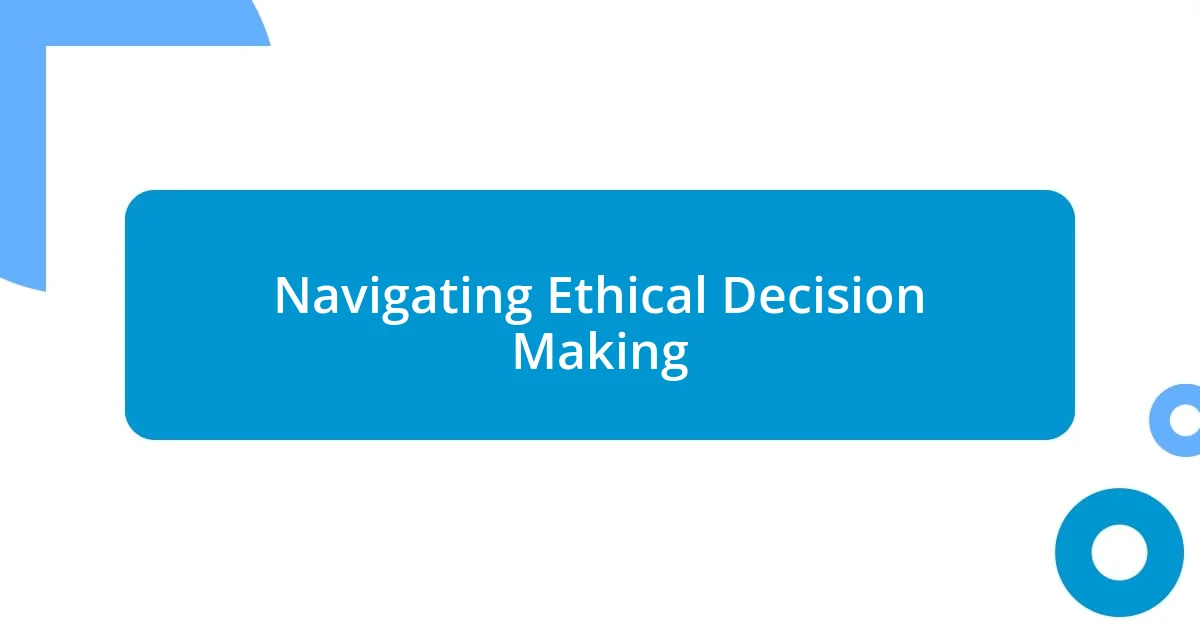
Navigating Ethical Decision Making
Navigating ethical decision-making in data practices requires a delicate balance between ambition and responsibility. I once faced a dilemma while working on a project that involved developing an algorithm for targeted advertising. Questions swirled in my mind: At what point do we cross from mere marketing strategy to manipulation? I realized that ethical considerations should always be front and center, especially when the potential repercussions of our decisions can significantly impact people’s lives.
In another instance, while assessing a data-sharing agreement, I had to weigh the potential benefits against the risks of undermining user trust. It was a tough spot, and I found myself reflecting on the long-term effects of our choices. Would we gain fleeting advantages at the cost of our credibility? This inner conflict reinforced a vital lesson: ethical decision-making isn’t just about avoiding pitfalls; it’s about forging relationships built on transparency and respect.
Moreover, engaging with colleagues around ethical challenges can spark enlightening conversations that help shape our perspectives. I can recall a team discussion where differing viewpoints illuminated the complexities of data usage in humanitarian projects. It dawned on me that navigating these waters isn’t just an individual responsibility—it’s a collective journey. How can we ensure that our ethical compass remains aligned with our mission? This collaboration fosters a deeper understanding of our responsibilities, ultimately guiding us to make choices that honor both data integrity and human dignity.



